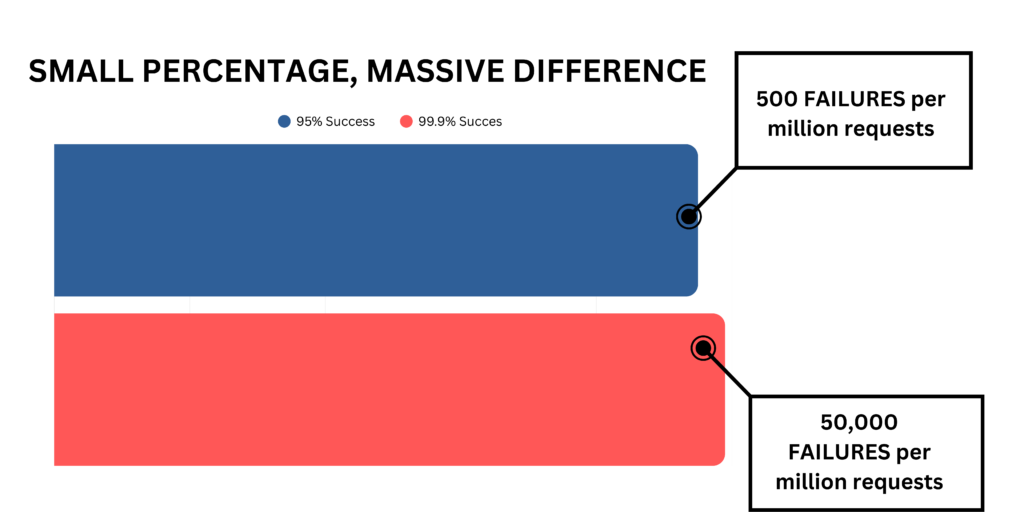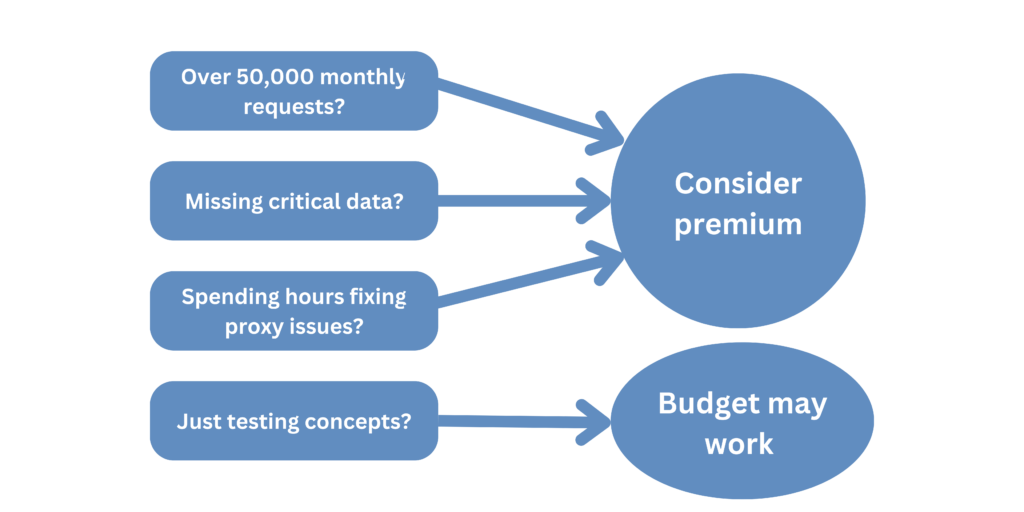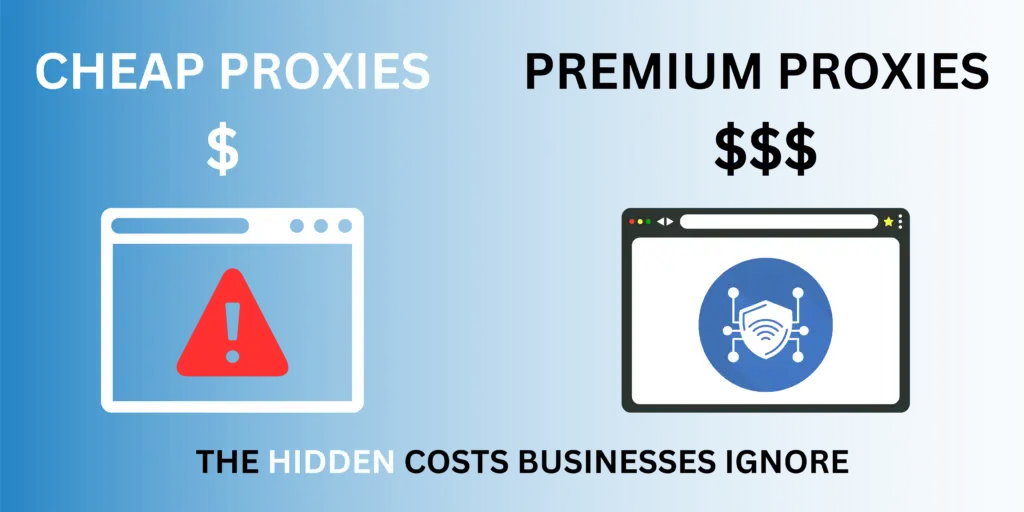Cheap proxies are like fast food. They look good at first. They cost less. But they harm your business in the long run.
I’ve seen this story play out hundreds of times. Companies start with budget proxies to “save money.” Six months later, they’re stuck in technical quicksand. Their data collection fails regularly. Their developers waste hours fixing connection problems. Their business intelligence is full of holes.
The proxy market in 2025 uses many tricks. Providers cut prices while making their service worse. They advertise “amazing deals” that simply cannot work as promised.
Let’s look at what cheap proxies REALLY deliver—and why quality services like IPBurger are actually the smarter financial choice.
What “Cheap” Really Means in the Proxy World
When we talk about cheap proxies, we usually mean:
- Datacenter proxies under $0.50 per IP
- Residential proxies under $2.00 per GB
- Mobile proxies under $5.00 per GB
These low prices don’t come from efficiency. They come from cutting corners on quality.
Here’s what “cheap” really means:
Overcrowded shared proxies. Imagine 30 people trying to use one bathroom at the same time. Your requests compete with many others, creating slow, unpredictable performance and security risks.
Used and blocked datacenter IPs. These are like digital secondhand goods with a bad history. Major websites have already flagged and blocked these IPs. You’re buying pre-damaged digital identities.
Dubious residential proxies. Budget residential proxies often use questionable methods to get access to people’s devices. Beyond being wrong, this creates legal risks most users never think about until they get a legal warning letter.
Free proxies. These are like eating food from a dumpster. They’re not just unreliable—they’re dangerous. Many exist to steal your passwords and data. Others insert malicious code into your traffic.
Cheap proxy sellers rely on customers not understanding the hidden costs. They’re selling you a $5 hammer to build a million-dollar house.
The REAL Cost of Cheap Proxies
The difference between a 95% and 99.95% success rate might seem small, but look at what it means in practice:
- With 10,000 requests: 500 vs. 5 failures
- With 100,000 requests: 5,000 vs. 50 failures
- With 1,000,000 requests: 50,000 vs. 500 failures

These aren’t just numbers. They represent important data you never collected. Market insights you missed. Business opportunities lost forever.
And the problems spread further.
Every proxy failure triggers retry attempts, timeouts, and connection resets. Each uses more resources. Each creates more delays. Each adds to your ACTUAL costs.
The real-world costs include:
Lost revenue from missing data. E-commerce businesses miss critical competitor pricing. Financial services miss market signals. Marketing teams work with incomplete information.
Wasted developer time. Technical teams spend 15-20 extra hours each week fixing connection problems instead of building valuable features. (At average developer rates, that’s $1,500-$2,000 wasted every week.)
Slower operations. When systems need extensive retry logic and failure handling, everything slows down. Companies using cheap proxies typically run at 40-60% of their potential speed.
Security risks. Budget providers rarely use strong security measures, creating opportunities for hackers. In 2024 alone, three major security incidents started through compromised proxy infrastructure.
Account blocks and recovery. When platforms detect suspicious activity from bad IPs, they block your accounts. Recovery typically takes 5-15 hours of staff time per incident.
The cruel math: Saving 20% on proxy costs often creates 200-300% higher costs elsewhere in your business.
When Cheap Proxies Make Sense
To be fair, budget proxies do work well in some situations:
Testing new ideas. When you’re just validating concepts before building something permanent, cheaper proxies can work fine.
Small, low-priority projects. Personal projects, academic research, or systems that don’t need perfect uptime can work with budget options.
Simple location testing. Basic checking of regional content differences rarely needs premium proxy features.
Personal content access. Individual users accessing region-restricted content typically don’t need premium features.
You’ve outgrown cheap proxies when you see:
- More than 5 hours weekly fixing connection problems
- Regular data quality issues
- Increasing blocks on target websites
- Growing reliance on the data for important business decisions
- More than 50,000 monthly requests
The turning point comes when the cost of missed or delayed data exceeds the extra cost of better proxies.
How Premium Proxies Work Differently
The technical differences between premium and cheap proxy services go far beyond just IP quality.
Smarter IP rotation systems. Budget providers use basic round-robin distribution. Premium services use intelligent algorithms that track success patterns, adapt to blocking signals, and optimize IP selection for specific targets.
Better session management. Keeping sessions active while changing IPs requires sophisticated handling that budget services cannot support. Premium providers maintain authentication even during IP changes.
Consistent digital fingerprints. Cheap proxies send basic headers that are easy to detect. Premium services create consistent, natural-looking browser fingerprints that avoid detection.
Network backup systems. Budget providers typically use single-path networks that easily fail. Premium services use multiple regions and providers with automatic failover systems.
Health monitoring. The big difference few talk about: premium providers constantly check their IPs and remove bad ones before they affect your operations.
The investment gap is huge. Quality providers like IPBurger run 24/7 engineering teams to monitor and improve their networks—expenses that budget providers simply cannot afford while keeping prices artificially low.
This creates two proxy markets: premium services that work consistently, and budget options that work sometimes.
IPBurger’s Technical Advantages
IPBurger has built system advantages that create measurable performance improvements:
100M+ properly sourced residential proxies. This isn’t marketing hype—it directly affects rotation quality and blocking avoidance. Larger pools allow more sophisticated distribution that prevents detection.
Coverage across 195+ countries and 2,000+ cities. This precision enables local targeting that budget providers cannot match. For tasks requiring local perspectives (pricing research, search result analysis, ad verification), this directly improves data quality.
Ethical sourcing methods. IPBurger’s system eliminates the legal risks of questionable consent methods. Every IP in their residential pool uses clear opt-in procedures with fair compensation.
99.95% success rate engineering. This isn’t just marketing—it’s measurable reality resulting from:
- Special scoring systems that evaluate each IP’s performance
- Smart rotation patterns that avoid detection
- Consistent browser signatures that eliminate suspicious signals
- Multi-layered routing that optimizes connection paths
Static Residential (ISP) innovation. IPBurger’s unique technology combines the reliability of dedicated proxies with the legitimacy of residential IPs—solving a fundamental proxy problem. For sensitive operations, this approach delivers unmatched stability.
Developer-friendly integration. IPBurger’s integration tools reduce implementation time by about 60% compared to budget alternatives. Their documentation and code examples across major programming languages make integration much easier.
Efficiency optimizations. Their proxy architecture uses advanced compression and connection reuse that reduces bandwidth use by 15-30% compared to budget alternatives—creating ACTUAL savings that offset premium pricing.
These aren’t small improvements. They are fundamental advantages that completely change the economics of your operations.
Real-World Cost Analysis
Let’s examine a realistic example for an e-commerce competitive monitoring operation:
Scenario: Monitoring 10,000 products across 50 e-commerce sites hourly.
Scale: About 12 million monthly requests.
| Metric | Budget Provider | IPBurger |
|---|---|---|
| Base Monthly Cost | $1,200 | $3,600 |
| Success Rate | 95% | 99.95% |
| Failed Requests | 600,000 | 6,000 |
| Developer Hours Fixing Problems | 80 | 5 |
| Developer Cost ($125/hr) | $10,000 | $625 |
| Data Completeness | 93% | 99.9% |
| Business Decisions Based on Incomplete Data | Multiple | Almost None |
| Actual Monthly Operational Cost | $11,200+ | $4,225 |
This isn’t theoretical—it’s based on real client experiences when switching from budget providers to IPBurger.
The TRUE cost-per-successful-request formula shows the reality:
True Cost = (Base Fee + Problem-Fixing Costs + Missed Opportunity Costs) / Successful Requests
For most operations, premium services deliver 30-50% LOWER true costs despite higher initial pricing. The difference grows as your operation scales and data importance increases.
How to Get the Most from Premium Proxies
Even with premium proxies, how you use them determines their value:
Schedule bulk requests during quiet times. Target websites typically use stronger bot detection during busy periods. Running bulk operations during known slow times can improve success rates by 5-15%.
Use smart timing based on website behavior. Adjusting request speed to match normal human patterns dramatically reduces blocking risk. The best approach adds 500-2000ms random delays between consecutive requests to the same website.
Rotate IPs based on behavior, not just request counts. Smart implementations change IPs based on browsing signals rather than arbitrary numbers. Rotation should match logical session changes that would happen in normal browsing.
Keep browser fingerprints consistent when changing IPs. Maintaining the same device characteristics even as IPs change eliminates one of the main signals that trigger anti-bot systems.
Use different proxy types for different targets. Different websites respond differently to various proxy types. Using target-specific proxy selection rules optimizes success while minimizing premium proxy usage for less sensitive targets.
These optimization techniques typically reduce premium proxy consumption by 20-35% while maintaining or improving overall success rates.
Making the Right Investment Decision
The point where premium services become the economical choice happens at different scales for different businesses:
- E-commerce operations: ~100,000 monthly requests
- Financial services: ~50,000 monthly requests
- Marketing intelligence: ~250,000 monthly requests
- Travel fare aggregation: ~500,000 monthly requests
Warning signs that cheap proxies are hurting your operations include:
- Increasing “no data” periods in your monitoring
- Growing developer frustration with connection reliability
- Rising CAPTCHAs and blocks
- Inconsistent results when repeating identical requests
- Data quality issues affecting business decisions

IPBurger’s unique position comes from their technology advantages combined with pricing that reflects actual infrastructure costs rather than unsustainable discounting. They’ve built for long-term quality rather than short-term growth metrics.
The proxy market will continue splitting through 2025, with budget providers making deeper quality cuts to maintain artificial price points while premium services enhance their advantages.
The question isn’t whether you can afford premium proxies. It’s whether you can afford the problems that cheap proxies create.
Choose carefully. Your data infrastructure deserves better than digital fast food.
FAQs
Why are cheap proxies so unreliable?
Cheap proxies have fundamental limitations: overcrowded networks, poor monitoring, previously blocked IP addresses, and minimal support. Their business model depends on high volume and low costs, which always sacrifices quality.
Do cheap proxies put my data at risk?
Yes. Budget proxy providers rarely use strong security measures like encrypted connections, secure login methods, or traffic monitoring. Many free and ultra-cheap proxies actively collect user data, making them serious security risks.
What’s the real price difference between cheap and premium proxies?
Initial prices show premium services costing 3-5x more than budget options. However, when calculating true operational costs (including developer time, data quality issues, and failure handling), premium services often deliver 30-50% LOWER total costs.
Can I mix cheap and premium proxies for different tasks?
Yes, this mixed approach often makes financial sense. Use premium proxies like IPBurger for critical operations requiring high reliability and cheaper alternatives for less important tasks where occasional failures don’t matter much.
Why does IPBurger perform better than other premium proxy providers?
IPBurger’s technical advantage comes from their exceptional IP pool quality (100M+ residential proxies), geographic coverage (195+ countries), and unique innovations like Static Residential (ISP) proxies that combine residential legitimacy with dedicated reliability.
At what scale do premium proxies become cost-effective?
The turning point typically occurs around 100,000 monthly requests for most business applications. Below this level, the operational problems of cheap proxies may still cost less than the premium alternative (though quality issues remain).
How do I calculate the real ROI of switching to premium proxies?
Track these metrics for 30 days: success rate percentage, developer hours spent fixing connectivity issues, data completeness percentage, and business impact of missing data. Apply these values to the formula: True Cost = (Base Fee + Problem-Fixing Costs + Missed Opportunity Costs) / Successful Requests.



